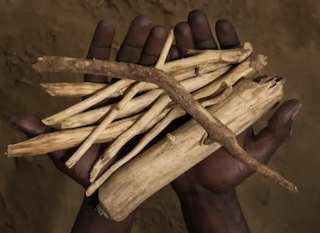Honoring the Origins of a Sacred Medicine
As healthcare professionals, our commitment to healing extends beyond clinical practice—it also involves understanding where our medicines come from and how their use impacts people and the planet. One such medicine is Iboga, a sacred root deeply woven into the spiritual and ecological fabric of Gabon’s rainforests. For centuries, Iboga has been central to the Bwiti tradition, guiding initiates through profound experiences of healing, clarity, and self-discovery.
Yet today, Iboga’s survival is under threat. Growing global demand for its psychoactive compound, ibogaine, has led to overharvesting and illegal trade, endangering both the plant and the communities who have safeguarded it for generations.
Preserving Iboga for Future Generations
The Tabernanthe iboga shrub is native only to Gabon and a few neighboring regions in Central Africa. Its roots contain ibogaine, an alkaloid known for catalyzing deep psychological healing and addiction recovery. For the Fang, Missoko, and other Bwiti communities, Iboga is not merely a substance; it is a sacred teacher and a living link to ancestral wisdom.
However, as global interest in ibogaine therapy grows, unsustainable harvesting has become a serious issue. Wild Iboga plants take years to mature, and excessive extraction without replanting disrupts both ecosystems and traditional practices.
To protect this heritage, sustainable cultivation and ethical trade frameworks are urgently needed. Supporting local stewards the Gabonese communities who have long protected and cultivated Iboga is central to this mission. Through regulated supply chains, fair compensation, and reforestation projects, we can ensure that Iboga remains available for both traditional and therapeutic use.
Iboga, A Spiritual and Cultural Pillar
In Bwiti ceremonies, Iboga is more than medicine, it is the root of spiritual connection. Its use fosters communal harmony, personal introspection, and initiation into deeper understanding of life’s mysteries.
When Iboga is harvested irresponsibly, these sacred practices are disrupted, and with them, the intangible heritage of Gabonese culture is put at risk. Preserving the groves and ensuring Iboga’s availability is therefore not just a matter of ecology, it is a matter of cultural survival.
Embracing Sustainable and Ethical Alternatives
To reduce pressure on wild Iboga, researchers and traditional practitioners alike are exploring sustainable alternatives.
One promising option is Voacanga africana, a West African plant containing precursor compounds that can be synthesized into ibogaine. Unlike wild Iboga, Voacanga can be farmed ethically and consistently, ensuring a stable, scalable, and environmentally responsible supply for therapeutic use.
In parallel, scientists are developing semi-synthetic and laboratory-produced ibogaine analogs. These innovations may help decrease dependence on wild plants while preserving the efficacy and spiritual integrity of Iboga-inspired medicine.
Policy reform also plays a key role. Encouraging ethical sourcing, indigenous partnerships, and transparent trade can foster a fair-trade ibogaine ecosystem that honors both scientific progress and ancestral wisdom.
Bwiti House’s Commitment to Sustainability
At Bwiti House, sustainability is not an afterthought, it is a guiding principle.
As one of the few centers authorized by Missoko Bwiti elders, Bwiti House integrates traditional authenticity with modern safety standards. The team works directly with local Gabonese communities to promote ethical harvesting, replanting initiatives, and the respectful preservation of sacred Iboga groves.
By choosing Bwiti House, participants not only engage in a transformative spiritual experience, they also support a regenerative movement, one that uplifts indigenous guardians, protects the rainforest, and ensures Iboga’s survival for generations to come.
Conclusion: A Shared Responsibility
Preserving Iboga means preserving culture, ecology, and consciousness.
Through mindful participation, responsible sourcing, and support for indigenous knowledge holders, we can ensure that this sacred root continues to guide and heal humanity without depleting its source.
Bwiti House stands at the heart of this mission, bridging ancient wisdom and modern understanding, sustainability and spirituality. Together, we can safeguard Iboga’s legacy and honor the people and ecosystems that make its medicine possible.
Learn More & Support Sustainable Iboga
To learn more about Bwiti House’s sustainability initiatives and ethical Iboga programs, visit:











